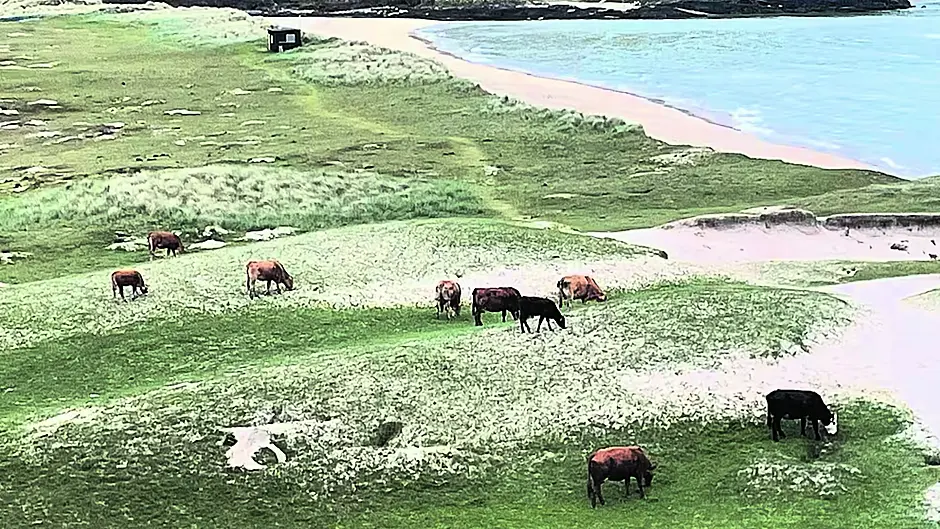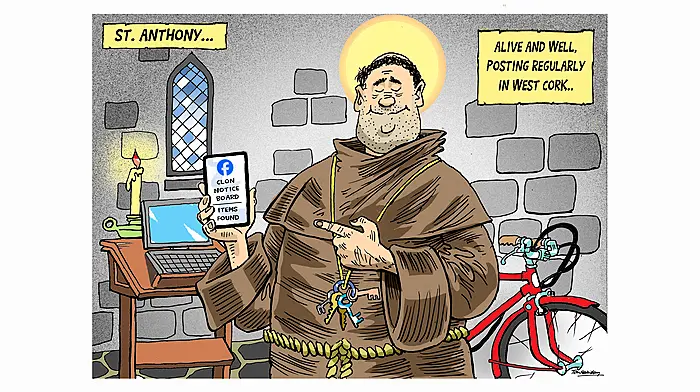Farmers agree not to allow livestock on special areas of conservation near Barleycove beach.
FATHER and son farmers from Goleen have entered into a signed agreement with Cork County Council not to allow their livestock wander onto local authority owned land at Barleycove.
James Oliver Coughlan (80) of Lissygriffin, Goleen, who owns land adjacent to the popular beach, and his son Timothy Coughlan of Carrigacat, Goleen, who owns some of the livestock, signed the agreement that was signed and witnessed by the defendants’ and the plaintiff’s legal teams and handed in to Judge Helen Boyle at a special sitting of the circuit court in Skibbereen on Monday.
Lengthy submissions had been made by the barrister acting for Cork County Council, David O’Dwyer (BL), instructed by Patricia Murphy a senior executive solicitor, as well as by the barristers acting for the defendants Michael McGrath (BL) and Byron Wade (BL), instructed by Letty Baker solicitor.
Mr O’Dwyer claimed that cows had become a problem, particularly during the summer months, as they wandered onto land adjacent to the beach thereby posing a safety threat to members of the public and people living locally.
On some occasions, Mr O’Dwyer said there was a bull amongst the herd and this led to fears that members of the public could be injured. He said there could also be a threat from cows protecting their calves.
Mr O’Dwyer told the court that the livestock were trespassing in special areas of conservation, and special areas of protection, at the edge of the beach. He also pointed out that Barleycove is a Blue Flag beach and the wandering animals were defecating on it.
Mr O’Dwyer outlined all of the previous court actions that had been taken, and the various undertakings that the defendant had given. Despite this, the barrister said: ‘The problem has persisted over the years and continued in 2020, ’22, ’23 and ’24.’
He said the defendant does share commonage with another local farmer, Liam Wilcox, but the defendant could not, and was not, claiming grazing rights on the portion of land which is in the ownership of Cork County Council.
Mr O’Dwyer said an area that is jointly used by the defendants and another farmer, Liam Wilcox, was also problematic. Despite the fact that the defendant’s property is ‘well fenced’ Mr O’Dwyer said a gate was being left open which allowed the cattle direct access to the Council’s car park.
The barrister said allegations had been made that the defendants left the gate open, but the defendants made a counter allegation claiming that the other user of the land was the culprit.
Mr O’Dwyer said: ‘The message doesn’t appear to be hitting home.’ He said the defendants were ‘playing ducks and drakes with the Council and it has to stop.’
He outlined how proceedings had been taken by the Council to prevent the first-named defendant from fencing off a public right of way at Chimney Cove, which is to the east of Barleycove Beach.
Using colour-coded maps, he also referred to other parcels of land and explained how the livestock was able to get onto the Council’s land, the land in front of local holiday properties and the local hotel, by crossing a tidal estuary when the water level was low.
The local authority’s barrister said the defendant wanted the Council to fence their own property, and he again reminded the court that it is a special area of conservation and a fence like that would require a ministerial order.
Mr O’Dwyer said it is up to the defendants, as trespassers, to resolve the matter and not put the Council, and the public purse, to the expense of erecting a new fence on an SAC and maintaining it. In short, he said: ‘They must look after their own house.’
Mr O’Dwyer said the Council decided to ‘fully prosecute its case because there hasn’t been a cessation of trespass.’ He also pointed out that the local authority had brought ‘an application for committal’ to send the defendant to prison.
However, the committal application was struck out with no further order as part of the final agreement made with the Council.
Judge Helen Boyle noted that previous undertakings made by the first named defendant had been ‘breached and breached and breached.’ She held that the issue was for the defendants to resolve because they cannot allow their animals to trespass on someone else’s property.
Michael McGrath, (BL) for the defendants, said his client had sought a pre-planning meeting with the local authority about erecting a fence but the Council would not validate the planning application.
He said the defendants were striving to achieve a long-term solution and he told the judge that committing an 80-year-old man to prison would not be the best way to resolve matters.
Judge Boyle said there was no point in making a court order unless it is enforced. With everyone in court with their legal teams, and their engineers, she suggested it was a good opportunity for them to arrive at an agreement.
Shortly after, a typed agreement, which was signed by the defendants, a senior executive officer with Cork County Council, and witnessed by members of both legal teams, was handed in to court.
It stated ‘the defendants undertake not to trespass upon and to permanently keep their cattle off of property at Dough, Barleycove in the County of Cork.’
As part of the agreement they are also to ‘erect and maintain temporary stock proof electric fencing (an electric fence)’ to ensure the cattle cannot pass from the defendant’s property onto Council land.
As part of the agreement, they are to remove the electric fence – which does not require a ministerial order even if it is erected in a special area of conservation – when they are no longer in occupation of the shared commonage.
The defendant also agreed to maintain the existing stock proof fencing; and to ‘keep and maintain the lock’ at the gate across from the car park when they are in occupation of the commonage.
The agreement also specified that the undertaking contained in the signed agreement ‘is made in substitution of all previous undertakings given by the defendants to the plaintiff.’
In addition, the defendant agreed to make a contribution of €5,000 toward the plaintiff’s costs of the proceedings on or before the 7th day of July 2025.
Meanwhile, the plaintiff’s motion for the committal, dated the 16th day of July 2024, was struck out.








